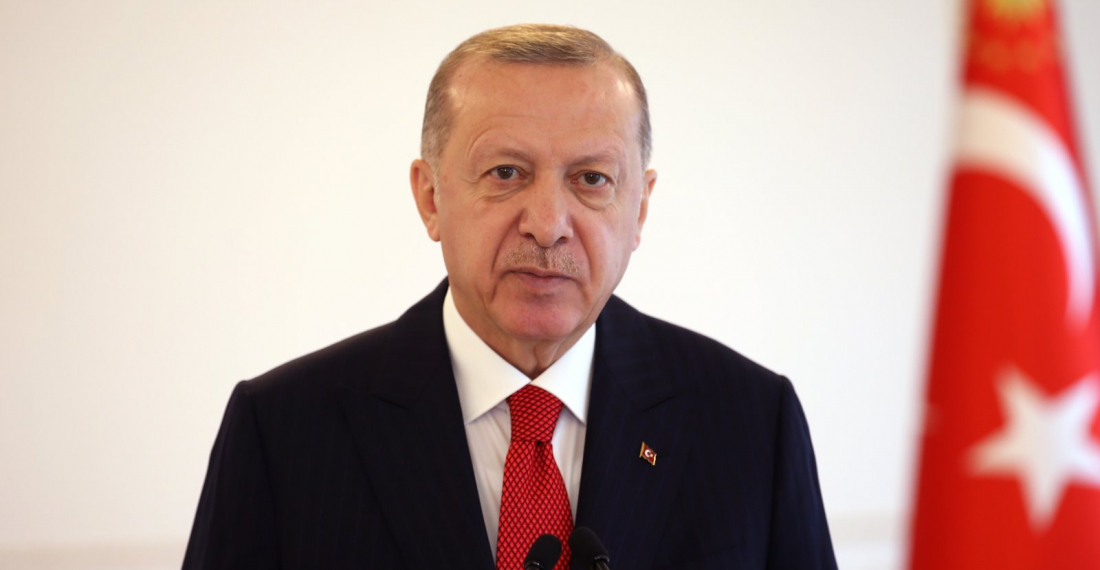In a speech that differed sharply in tone from recent pronouncements, Turkish president, Recip Tayip Erdogan, on Saturday appeared to reach out to European and NATO countries, with who his government often appeared at odds in recent times.
"We want to be in stronger cooperation with our friends and allies," Recep Tayyip Erdogan told his ruling AKP's regular provincial congresses held virtually as part of COVID-19 measures.
“We see ourselves nowhere else but in Europe. We contemplate to build our future together with Europe,” he added.
He also noted that Ankara wants to use its long and close ally relations with Washington actively in resolving the regional and global issues.
“We believe that we do not have any problem with any country or institution that cannot be solved through politics, diplomacy, and dialogue,” he stressed.
Erdogan urged the European Union to keep its promises, not to discriminate, and at least not to be a tool of “explicit hostility” against Turkey. He said Turkey also cannot ignore countries, such as Russia and Iran, with which it has deep-rooted ties.
“We seek to improve our cooperation with almost all regional pacts in the world,” he said, adding that Turkey works for solutions based on territorial integrity and political unity everywhere it is involved, from Syria to Libya.
Erdogan said Turkey has always kept these communication channels open and will continue to do so.
Erdogan's speech came amid intensive behind the scenes diplomatic efforts to avoid further deterioration in EU - Turkey relations.
On Friday (20 November) Turkey's presidential spokesperson, Ibrahim Kalin who was on a visit to Brussels, said EU membership is a strategic priority for Ankara and that the bloc's leaders should see Turkey-EU relations strategically.
During the visit, he separately met Maryem Van den Heuvel - the chief foreign policy advisor to the EU Council President Charles Michel, Bjoern Seibert, Advisor to the President of the European Commission Ursula von der Leyen, and Helga Schmid - the secretary-general of the EU’s external action service.
Among the topics of discussion were Turkey-EU relations, situation in the Eastern Mediterranean, Libya, Syria, and Karabakh.
The strategic importance of the Turkey-EU relations is increasing, and there is a need for “new and concrete” steps to bring a new dynamism, to boost cooperation and to strengthen the relations of mutual trust, Kalın added. He also underlined the need for new ideas for a fair and permanent solution of the Cyprus issue and said Turkey is ready to start exploratory talks with Greece. He added Turkey will continue its constructive approach to protect peace and stability in the region.
An EU summit is expected to be held on 10-11 December. The summit is expected to take decisions on the future of Turkey-EU relations.
On Thursday (19 November) German Foreign Minister Heiko Maas urged Turkey to stop provocations in the Eastern Mediterranean or face potential EU sanctions next month, indicating that Berlin is increasingly losing patience with Ankara. EU foreign policy chief Josep Borrell also increased the pressure on Turkey. He warned Ankara that it is “widening its separation from the EU” and said the bloc was “approaching a watershed moment in our relationship with Turkey.”
EU leaders agreed in early October they would take “appropriate” measures against Turkey at their December meeting should Ankara not “stop illegal activities vis-à-vis Greece and Cyprus,” such as sending vessels for gas exploration into the waters of those countries. Leaders warned the EU “will use all the instruments and the options at its disposal” — a clear reference to sanctions.
However German Chancellor Angela Merkel pushed for a “positive political EU-Turkey agenda” and this was also agreed by EU leaders in early October, promising Ankara increased political, economic and social ties if it reduces tensions.






